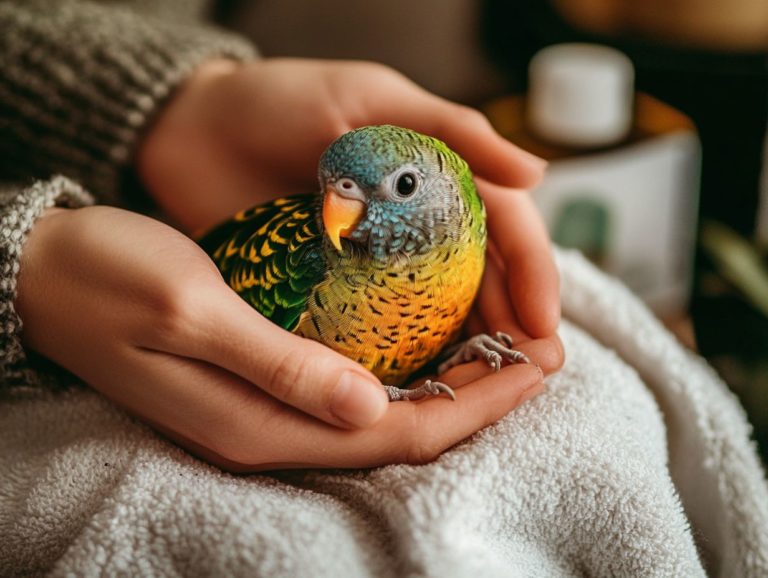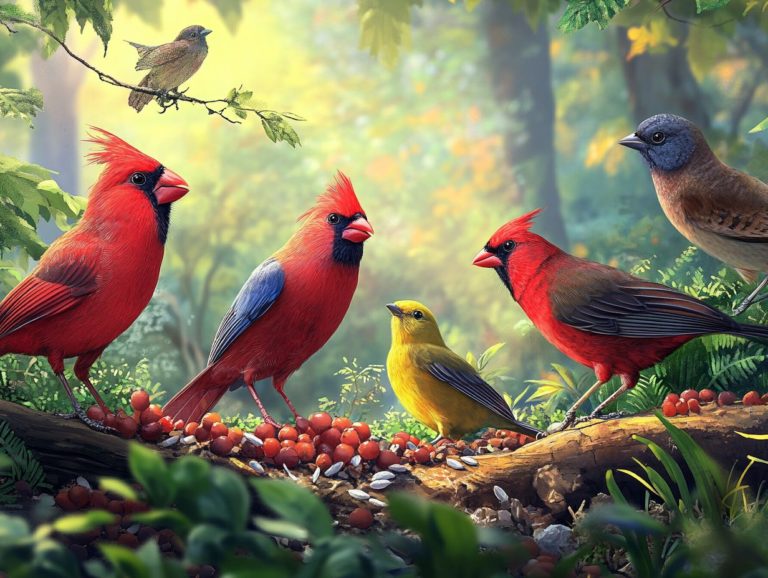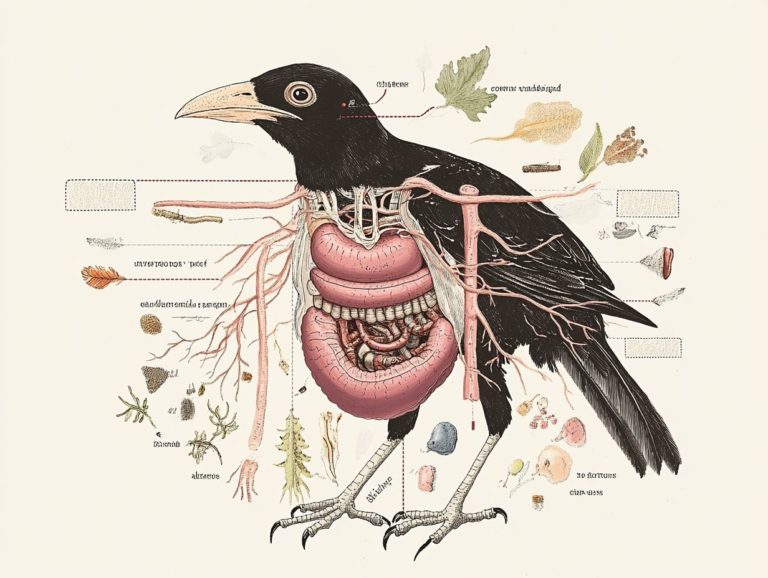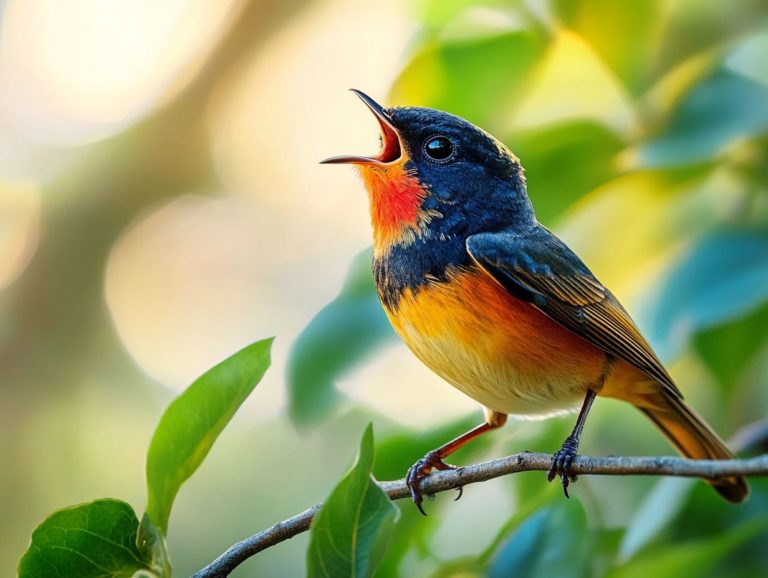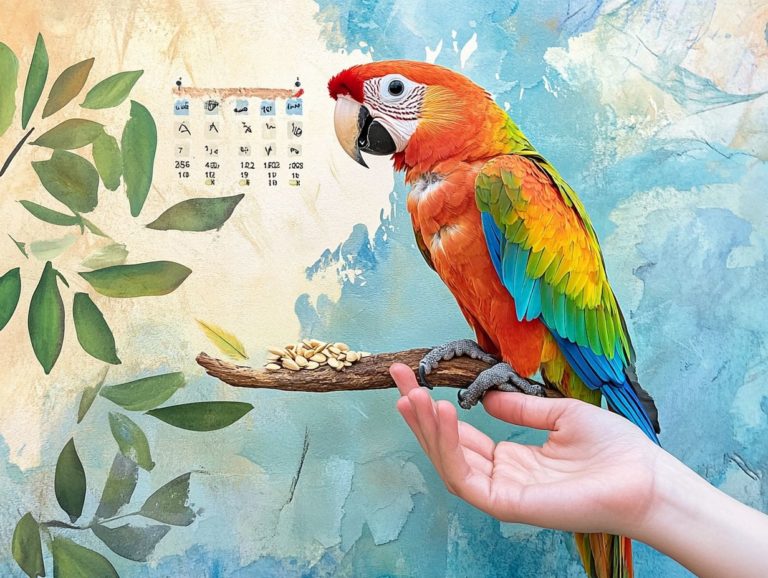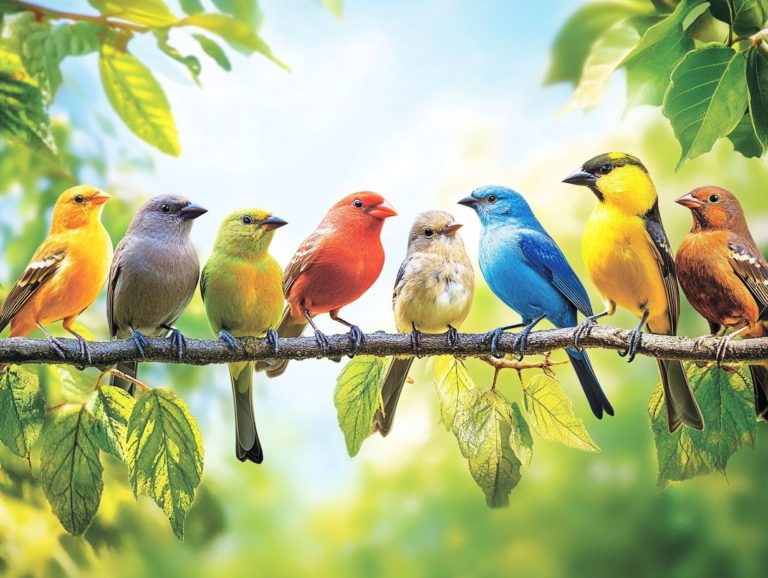5 Common Dietary Mistakes Bird Owners Make
Feeding your pet bird a balanced diet is essential for their health and happiness. Yet, many bird owners inadvertently make dietary missteps that can affect their bird’s health.
Relying solely on seeds or neglecting fresh fruits and vegetables are common pitfalls that can lead to serious health issues for your feathered companion. This highlights the importance of responsible bird care.
This article delves into five frequent dietary errors bird owners often make. It offers you valuable tips on how to provide the nutrition your avian friend deserves.
Discover a variety of healthy food options, feeding guidelines, and the impact of diet on different species and ages. We’ll also cover the benefits of varied perches and bird toys for their overall well-being. Keep reading to ensure your bird not only survives but truly thrives!
Contents
Key Takeaways:
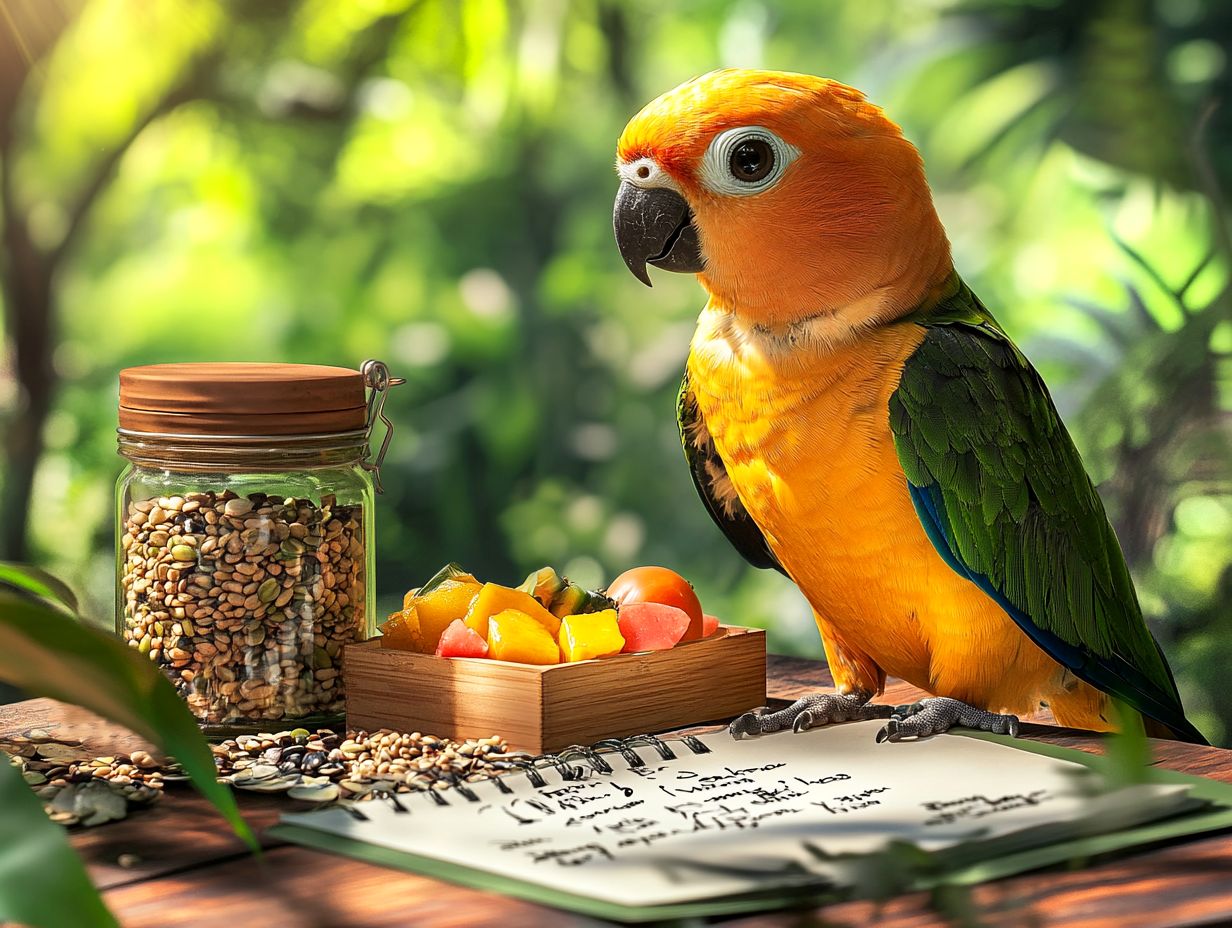
- Feeding only seeds can lead to nutrient deficiencies in pet birds.
- Fresh fruits and vegetables should make up a significant portion of a bird’s diet for optimal health, ensuring proper nutrition and hydration.
- Proper portion control is important to prevent overfeeding or underfeeding, which can have negative effects on a bird’s health.
1. Feeding Only Seeds
Feeding your pet birds, like Parrots and Cockatiels, only seeds is a common misstep. This can lead to serious nutritional deficiencies and health issues, resulting in health issues if food becomes contaminated.
Proper nutrition is vital for their overall well-being. You want to ensure they re thriving.
A seed-only diet simply doesn t provide the essential vitamins, minerals, and amino acids necessary for optimal health. Thus, incorporating safe food options is crucial. Without fresh fruits and vegetables in the mix, your birds might face weakened immune systems, feather plucking, and even obesity.
It s crucial to recognize that bird nutrition should be diverse. Incorporate a variety of food sources, such as leafy greens, fortified pellets, and the occasional healthy treat, to keep your birds vibrant and healthy while minimizing food waste.
By being proactive with their dietary choices, you can avert the serious consequences of feeding mistakes, as highlighted in the 5 common mistakes new bird owners make, and create a nurturing environment where your feathered companions truly flourish.
2. Not Providing Enough Fresh Fruits and Vegetables
One common oversight in bird ownership is overlooking the importance of fresh fruits and vegetables. These are essential for ensuring proper nutrition and preventing food contamination, which is critical to bird safety. For more insights, check out these 5 quick tips for feeding your bird.
By incorporating a variety of fresh produce into your bird s daily meals, you significantly enhance their diet. This simple step can supercharge your birds’ health!
Leafy greens like kale and spinach are rich in calcium and vitamin K, crucial for maintaining strong bones. Meanwhile, vibrant fruits such as berries and apples pack a punch of antioxidants that help boost the immune system.
When you introduce these fresh foods, remember to do it gradually and monitor their behavior to ensure they are receptive to the new flavors. This allows your birds to acclimate and explore new flavors at their own pace.
It’s also important to maintain hygiene. Regularly clean feeders and food dishes and remove any uneaten produce to prevent harmful bacteria from taking hold. This simple practice safeguards your feathered friends health and well-being.
3. Overfeeding or Underfeeding
Both overfeeding and underfeeding can significantly impact a bird’s health. Proper nutrition is essential for their safety and for understanding their unique feeding behaviors while practicing bird care.
To determine the right amount of food for your bird, consider factors such as species, age, and activity level. This is especially important for exotic birds that may have unique dietary requirements. For example, younger birds typically need more frequent, smaller meals. In contrast, adults may thrive on a regular feeding schedule.
Offering a variety of healthy foods like seeds, fruits, and vegetables will help you meet their nutritional needs while minimizing food waste. This will also ensure clean feeders. Pay attention to their feeding habits, such as how quickly they eat or their enthusiasm for certain foods. This observation can enhance your understanding of their hunger cues and their bird grooming and stimulation needs.
Being attentive promotes a balanced diet and enriches their overall well-being.
4. Giving Table Scraps
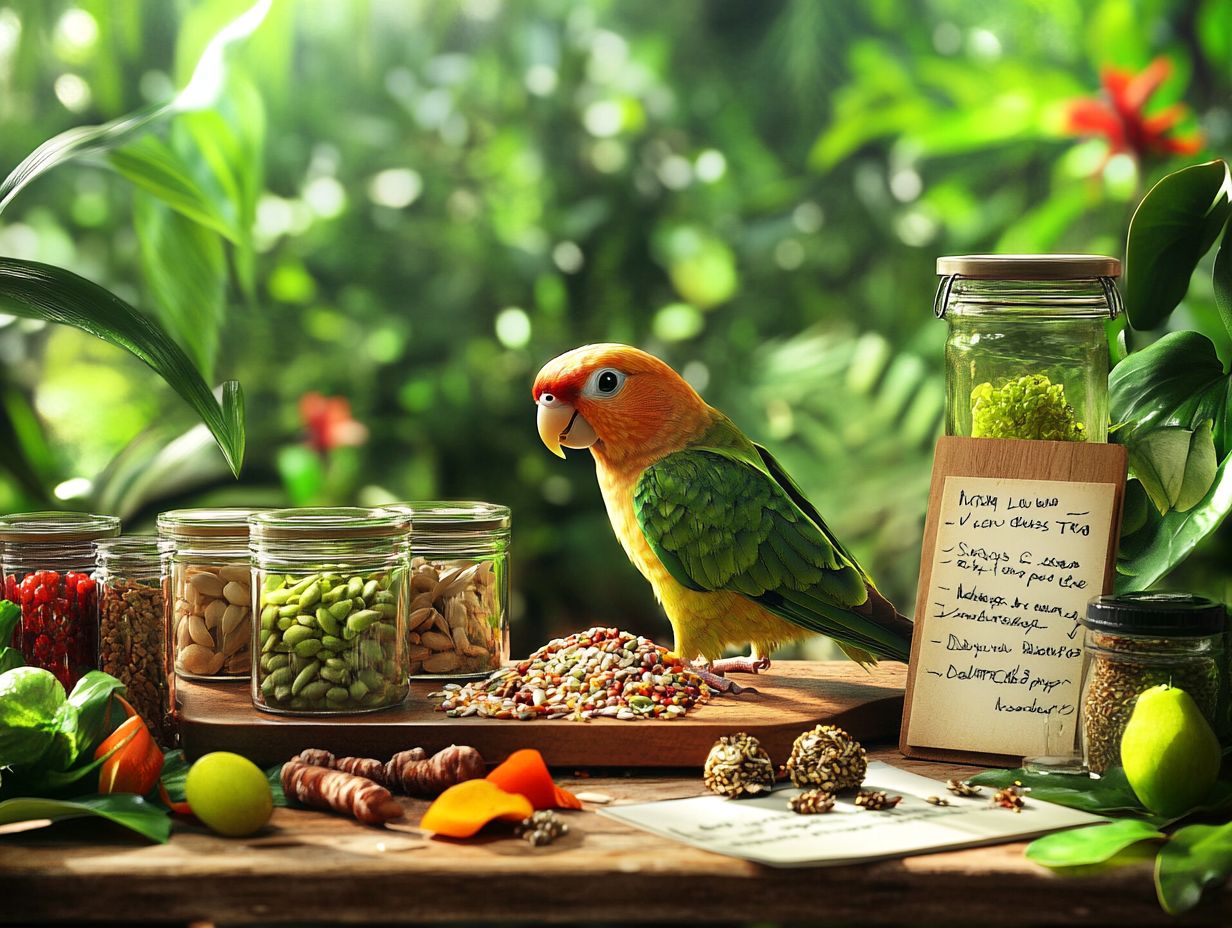
Giving table scraps to birds is a risky choice that can expose them to unsafe food choices and potential contamination, ultimately jeopardizing their health and well-being.
Certain human foods, such as chocolate, avocado, and caffeine, are outright toxic to birds. Even seemingly harmless items like bread can lead to health problems, as they often lack the essential nutrients birds need.
As a bird owner, it’s crucial to understand the dangers associated with scraps. These choices can result in malnutrition or serious health issues. Instead, focus on a balanced diet that includes fresh fruits, vegetables, and specially formulated bird pellets. To provide the best care, be sure to learn about the essentials in bird nutrition. This ensures that your feathered friends receive vital nutrients without the risks tied to table scraps.
By educating yourself about safe food options, you can make informed choices that promote longevity and vitality in your avian companions while ensuring their proper nutrition.
5. Not Providing Enough Calcium
A common yet critical mistake you might make as a bird owner is neglecting to provide enough calcium, which is vital for your feathered friend’s health. To avoid such pitfalls, be sure to check out the 5 common mistakes in bird training. This nutrient is particularly crucial for species that rely on it for strong bones and overall well-being.
When calcium intake is insufficient, serious health issues can arise. You could see weakened bones and an increased risk of fractures. If you have breeding birds, reproductive problems may also occur, making calcium a crucial component of their diet. Keep an eye out for symptoms of calcium deficiency, which may include lethargy, poor plumage quality, muscle twitching, or egg-binding in females.
To prevent these complications, it’s essential to incorporate high-calcium foods into their diet, such as:
- Broccoli
- Kale
- Fortified pellets
Certain supplements can fill nutritional gaps. For tailored dietary advice specific to your bird’s species or individual needs, consult a veterinarian who specializes in birds. This is especially important regarding their unique feeding techniques.
How to Ensure a Balanced Diet for Your Pet Bird?
Ensuring a balanced diet for your pet bird requires a thoughtful approach to food selection. Focus on proper nutrition tailored to the specific needs of various exotic birds and their safe cooking practices. This attention to detail ultimately influences their health and longevity.
Recognizing that different species have unique dietary requirements is essential for bird owners, particularly for those who keep exotic birds. By incorporating a variety of food sources, you not only keep their meals exciting but also provide the essential nutrients they need. Fresh fruits and vegetables should be part of their daily menu, as they are packed with vitamins and minerals crucial for maintaining vibrant plumage and optimal energy levels.
Be vigilant about common pitfalls, such as relying too heavily on seeds, which can lead to obesity and other health issues. To help avoid these mistakes, consider reading the top 10 bird food mistakes to avoid. Employ practical strategies like rotating food types and consulting with avian veterinarians to create a well-rounded diet that supports your bird’s overall well-being and proper housing needs.
What Are Some Healthy Food Options for Birds?
Providing healthy food options for birds is essential to maintaining their vitality. It’s equally important to focus on bird hygiene. A diverse diet that includes fresh fruits, vegetables, and grains, along with the 5 essential nutrients for pet birds, ensures they receive optimal nutrition, reducing the risks of food mistakes.
As a pet owner, understanding the specific dietary needs of different species, including Hummingbirds, is crucial for effective feeding strategies. Parrots may thrive on leafy greens and pellets. In contrast, canaries often prefer seeds with the occasional fruit treat. Exotic birds like cockatoos tend to enjoy nuts in moderation. Pay careful attention to portion sizes to avoid overfeeding, which can lead to health issues.
When preparing meals, consider lightly steaming veggies to preserve their nutrients or offering them raw for that satisfying crunch. Always ensure that the foods you serve are free from pesticides and harmful additives. This maintains a fully balanced diet for your feathered friends while keeping their feeding area clean.
How Much and How Often Should Birds Be Fed?
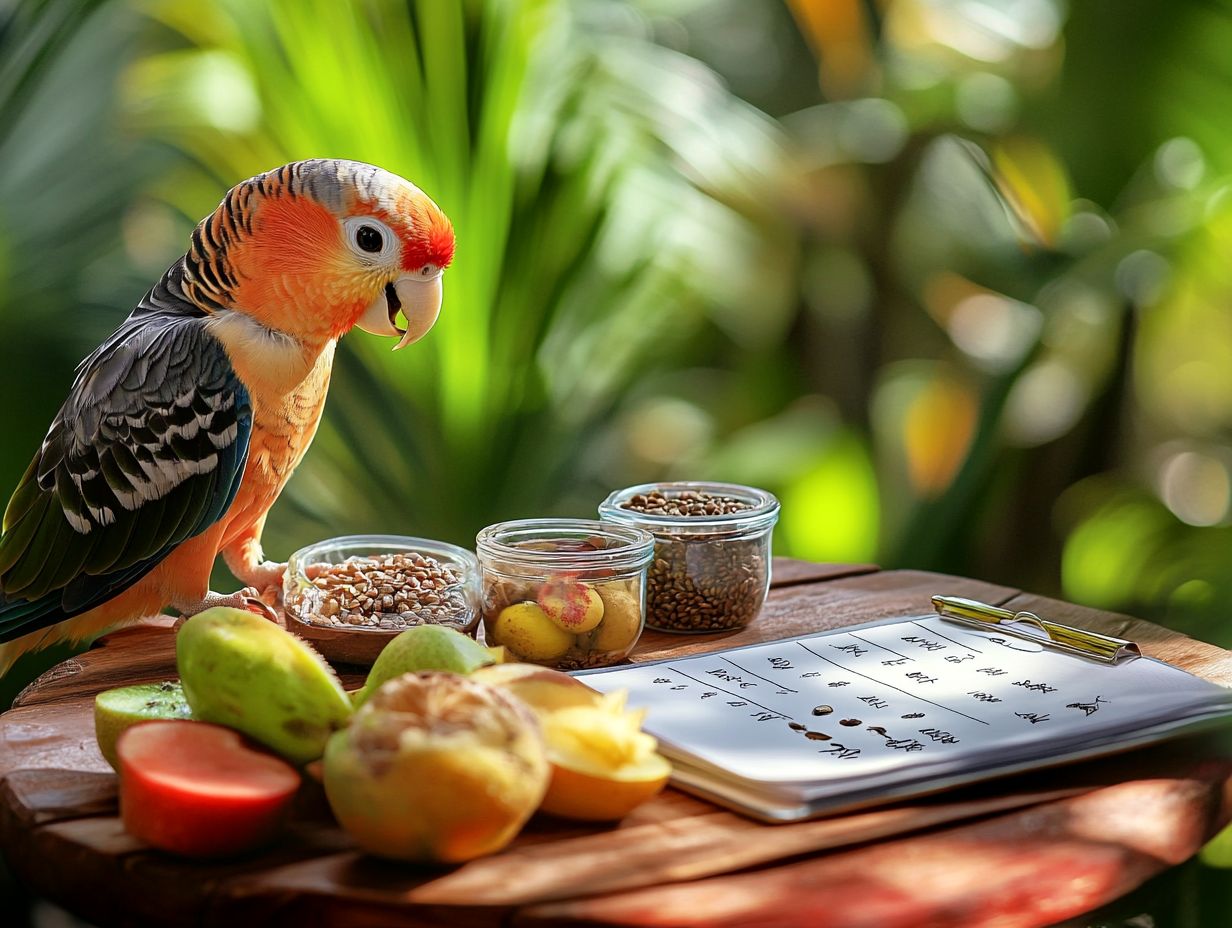
Determining how much and how often to feed birds can feel like a puzzle. Grasping their unique feeding behaviors and dietary needs is vital for ensuring they receive proper nutrition and maintain their health, especially in light of indoor pollutants.
Factors such as species, age, and activity level significantly influence this process. For example, active juveniles might require larger portions and more frequent feedings than their adult counterparts.
As a general guideline, offering smaller meals multiple times throughout the day aligns beautifully with a bird’s natural foraging instincts. Consistency is key; keeping to a regular feeding schedule fosters a stable routine that birds truly thrive on.
Maintaining a clean feeding area is crucial. This prevents food contamination and promotes overall well-being. Committing to daily cleaning is an essential task for any responsible bird owner.
What Are the Consequences of a Poor Diet for Birds?
A poor diet can have serious consequences for your birds, leading to a range of health issues that might require a trip to the avian vet, a veterinarian who specializes in bird care. You may notice signs of calcium deficiency, weakened immune systems, and changes in behavior, which can often be linked to neglecting bird care and nutrition.
These problems can manifest as brittle bones, increased vulnerability to infections, and behavioral shifts like aggression or excessive vocalization. Long-term nutritional deficiencies can stunt growth and hinder proper feather development, ultimately affecting your bird’s overall vitality.
Provide a balanced diet rich in vital vitamins and minerals. Incorporate a variety of fruits, vegetables, and high-quality pellets. Keeping a close eye on their eating habits and offering enrichment can help you preemptively tackle potential issues.
If you notice any significant changes in behavior or physical health, seeking professional advice promptly can dramatically enhance their well-being.
Take charge of your bird’s health today start with a nutritious meal plan that makes feeding fun and exciting!
How Can a Bird’s Diet Change Depending on Their Age and Species?
A bird’s diet must be adaptable because their nutritional needs vary significantly by age and species. This requires a tailored food selection to ensure proper nutrition throughout their life stages.
Consider fledglings! They need nutrient-dense, high-protein foods to support their rapid growth and development. Adult birds, on the other hand, require a balanced diet rich in vitamins and minerals to maintain optimal health. Adjusting food choices is crucial. For instance, while parrots thrive on a diverse array of fruits, vegetables, and high-quality pellets, cockatiels might need a diet lower in fat but richer in seeds and greens.
As parrots age, they may face health issues. This requires easily digestible foods with lower protein content, making it important to monitor their diet closely. By understanding these changes, you can provide the right nutrients at different life stages, ensuring the overall well-being of your feathered companions!
What Are Some Tips for Encouraging a Balanced Diet for Birds?
Encouraging a balanced diet for your birds can be done easily! Focus on diverse food varieties, wholesome meals, and engaging feeding techniques that tap into their natural instincts.
Start by mixing a delightful combination of seeds, fruits, and vegetables. This way, your feathered companions can enjoy a variety of flavors and textures! Consider using bird toys that dispense food; this makes mealtime exciting and fun!
When introducing new foods, do so gradually. This gives your birds time to adjust and explore fresh tastes. Remember, your feathered friends are keen observers. Modeling healthy eating habits yourself can positively influence them!
Regularly monitor and adjust their dietary intake. This allows you to fine-tune their options based on their preferences and health needs.
Frequently Asked Questions
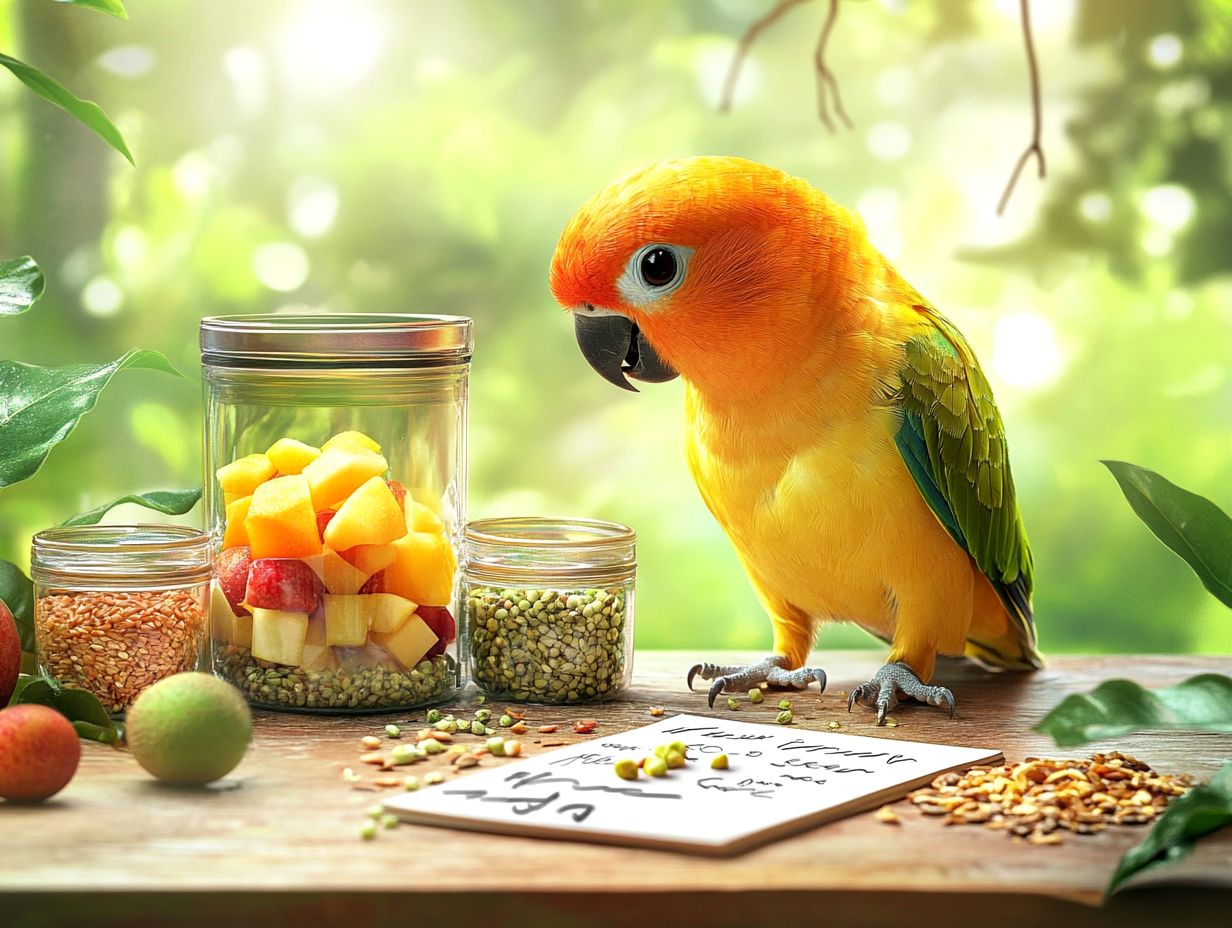
What are the most common dietary mistakes bird owners make?
Some common mistakes include not providing a varied diet, overfeeding unhealthy foods, and not offering enough fresh fruits and vegetables. It’s important to avoid giving too many treats and ensure your bird gets essential nutrients. Incorporating superfoods for a healthier bird can help address these nutritional gaps.
Is it okay to feed my bird only seeds and pellets?
No! Feeding only seeds and pellets can cause vitamin deficiencies, obesity, and liver issues.
Can I give my bird human food as part of their diet?
Yes, but only in moderation and with caution. Some human foods, like avocado, chocolate, and caffeine, can be toxic to birds. Always research and consult with a veterinarian before adding human food!
What are some healthy options to include in my bird’s diet?
Fresh fruits and vegetables, whole grains, lean protein sources, and calcium and vitamin supplements are vital. Talk to your veterinarian for specific recommendations for your bird!
How often should I feed my bird?
The frequency of feeding depends on the species and size of your bird. Smaller birds may need multiple feedings a day, while larger birds may only need one or two. Consult your veterinarian for an appropriate feeding schedule!
Can I give my bird treats?
Yes, treats can be given, but in moderation! They should not make up a large portion of your bird’s daily intake and should be used occasionally as a reward.
For your bird’s specific dietary needs, consult your veterinarian! Ensuring a balanced diet is key to their happiness and health.

